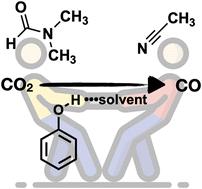当前位置:
X-MOL 学术
›
Dalton Trans.
›
论文详情
Our official English website, www.x-mol.net, welcomes your
feedback! (Note: you will need to create a separate account there.)
Solvents and their hydrogen bonding properties as general considerations in carbon dioxide reduction by molecular catalysts
Dalton Transactions ( IF 3.5 ) Pub Date : 2024-12-20 , DOI: 10.1039/d4dt02682a Xiaohan Li, Jeffrey J. Warren
Dalton Transactions ( IF 3.5 ) Pub Date : 2024-12-20 , DOI: 10.1039/d4dt02682a Xiaohan Li, Jeffrey J. Warren

|
Improvements to the understanding of how reaction conditions influence the performance of molecular electrocatalysts are important. There exists a wide range of solution conditions that are used in the investigation of the properties and performance of electrocatalysts, from the choice of solvent or electrolyte to the identity and nature of other additives, like Brønsted acids. Herein, we demonstrate how the choice of solvent can have a significant impact on the observed rate constants for CO2-to-CO conversion by a series of rhenium(I) diimine complexes. In comparison with the observed rate constants in acetonitrile solvent, the use of a strong hydrogen bond-accepting solvent (N,N-dimethylformamide, DMFf) dramatically decreases the observed rate constants in the presence of added phenol (as a proton donor). Based on previous work from our lab and from others, we conclude that such solvent effects are a general phenomenon and are a crucial consideration for investigation of molecular catalysts. Finally, a simple H-bonding model is presented to account for solvent effects in these rhenium(I) CO2 reduction systems. The model is general for H-bonding solvents and Brønsted acids and provides a first principles means to estimate the magnitude of solvent effects on CO2 reduction kinetics.
更新日期:2024-12-20






























 京公网安备 11010802027423号
京公网安备 11010802027423号